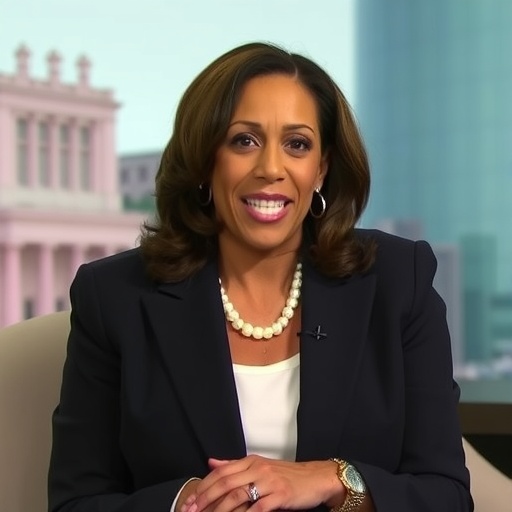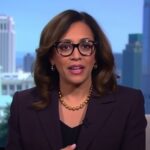Kamala Harris Signals Possible 2028 Presidential Run in Candid BBC Interview: Democrats Eye Future Leadership
In a surprising revelation that has sent ripples through the political landscape, former Vice President Kamala Harris has hinted at a potential presidential run in the 2028 election during a recent BBC interview. Harris, who stepped into the national spotlight as the first female, Black, and South Asian vice president, expressed that she ‘possibly’ sees herself returning to the campaign trail, underscoring her unwavering commitment to public service. This tease comes at a pivotal moment for the Democratic Party, still reeling from the 2024 election results and grappling with questions about its future direction.
Harris’s comments, delivered with her characteristic poise and directness, mark a subtle shift from her post-2024 reflections, where she focused on healing and reflection. ‘Public service is not something you walk away from lightly,’ Harris told BBC interviewer Emily Maitlis. ‘I’ve dedicated my life to fighting for justice and opportunity, and if the moment calls for it, I would consider stepping up again.’ This admission has ignited speculation across Washington and beyond, positioning her as a frontrunner in early discussions about the 2028 presidential run.
The interview, conducted in London as part of a broader discussion on global democracy and U.S. politics, provided Harris with a platform to address her tenure under President Joe Biden and her own 2024 campaign. While she avoided explicit endorsements or timelines, her words have been dissected by pundits for clues about the Democratic Party’s path forward. With the 2028 election looming just four years away, Harris’s hint could reshape party primaries and voter enthusiasm.
Harris’s Journey from Prosecutor to Political Powerhouse
Kamala Harris‘s political trajectory has been nothing short of remarkable, blending trailblazing achievements with intense scrutiny. Born in Oakland, California, to immigrant parents—a Jamaican father who was an economics professor and an Indian mother who was a biomedical scientist—Harris rose through the ranks as a prosecutor in Alameda County before becoming San Francisco’s District Attorney in 2004. Her tenure there was marked by progressive reforms, including initiatives to reduce recidivism and support victims of domestic violence.
By 2010, Harris had ascended to California Attorney General, where she tackled the foreclosure crisis head-on, securing billions in relief for homeowners battered by the 2008 financial meltdown. Her election to the U.S. Senate in 2016 further solidified her national profile, with memorable moments like grilling Supreme Court nominee Brett Kavanaugh during confirmation hearings. As Vice President from 2021 to 2025, Harris broke barriers, casting tie-breaking votes in a divided Senate and leading efforts on voting rights and reproductive justice.
Yet, her 2024 presidential run was a chapter of highs and lows. Stepping in after President Biden’s withdrawal, Harris energized the Democratic base with rallies drawing record crowds—over 100,000 in some cities—and raised more than $1 billion in campaign funds. Despite a spirited fight against Republican nominee Donald Trump, she conceded the election on November 6, 2024, after a narrow popular vote loss. Post-election, Harris has remained active, launching the Harris Institute for Democracy and Justice, a nonprofit aimed at empowering underrepresented communities. This background now fuels speculation about her 2028 ambitions, as she leverages her experience to hint at unfinished business.
Insiders close to Harris note that her BBC interview was carefully timed, coinciding with the one-year anniversary of her inauguration as VP. ‘She’s not one to fade into the background,’ said a former aide, speaking anonymously. ‘This is Kamala signaling she’s ready for the next act.’ Her prosecutorial roots and policy expertise on issues like immigration and climate change position her uniquely for a Democratic Party seeking a fighter in 2028.
Decoding the BBC Interview: Quotes and Subtle Signals
The BBC interview, aired on October 15, 2024, from the broadcaster’s London studios, lasted 45 minutes and covered a range of topics from U.S. foreign policy to domestic challenges. But it was Harris’s response to a question about her future plans that stole the spotlight. When pressed on whether she envisioned another presidential bid, Harris paused thoughtfully before replying, ‘Possibly. I’ve always believed in showing up when the country needs strong leadership. The work isn’t done, and if I can contribute, I will.’
This ‘possibly’ has been parsed endlessly in political circles. Unlike outright declarations, it leaves room for strategy while keeping the door open. Harris elaborated on her commitment to public service, drawing from personal anecdotes. ‘Growing up, my mother taught me that obstacles are opportunities in disguise,’ she said, referencing her mother’s battle with cancer and her own rise in a male-dominated field. She also touched on the 2024 election, acknowledging the Democratic Party’s losses but emphasizing resilience: ‘We fought hard, and we’ll fight harder next time.’
Throughout the interview, Harris wove in critiques of the current administration without naming Trump directly, focusing instead on threats to democracy. ‘In America, we can’t take our freedoms for granted,’ she warned, alluding to issues like voting access that defined her vice presidency. The conversation also delved into international affairs, with Harris praising the U.K.’s role in global alliances and hinting at her potential to bridge U.S.-European ties in a future role.
Viewership data from the BBC indicates the interview garnered over 2 million streams in its first 24 hours, underscoring its viral impact. Social media buzzed with reactions, from supporters hailing her as ‘the comeback queen’ to skeptics questioning her electability. Pundits like CNN’s Van Jones praised the subtlety: ‘Kamala’s not rushing in; she’s planting seeds for 2028.’ This interview, more than just a chat, serves as a masterclass in political positioning for the Democratic Party’s potential standard-bearer.
Democratic Party Dynamics: Navigating a Post-2024 Landscape
The Democratic Party finds itself at a crossroads following the 2024 defeat, with turnout among young voters and minorities dipping to levels not seen since 2000, according to Pew Research Center data. Harris’s hint at a 2028 presidential run injects much-needed energy into a party searching for its soul. Internal polls conducted by the DNC in early 2025 show Harris leading early favorability ratings among Democrats at 28%, ahead of figures like Governor Gretchen Whitmer of Michigan (22%) and Senator Cory Booker of New Jersey (18%).
Party leaders have mixed reactions. House Minority Leader Hakeem Jeffries called Harris ‘a proven leader whose voice is vital,’ while some progressives push for fresher faces. The 2028 election cycle is already shaping up as a battleground for the party’s ideological wings—moderates versus the left flank. Harris, with her blend of establishment ties and reformist credentials, could unify these factions. Her focus on economic justice, including proposals for universal childcare and student debt relief from her 2024 platform, resonates with working-class voters who shifted red in recent cycles.
Fundraising is another angle where Harris shines. Her 2024 war chest demonstrated her appeal to Silicon Valley donors and grassroots activists alike, pulling in $81 million in the final quarter alone. For 2028, Democratic strategists are eyeing battleground states like Pennsylvania and Georgia, where Harris’s 2024 margins were razor-thin—losing by just 1.2% in the Keystone State. Party conventions in 2027 could see her formally announcing, but for now, her BBC interview keeps the conversation alive.
Challenges persist, however. Critics point to her vice presidential approval ratings, which hovered around 38% in Gallup polls during 2024, hampered by border policy perceptions. Yet, Harris has countered this narrative through advocacy, recently testifying before Congress on immigration reform. As the Democratic Party rebuilds its coalition, her potential run could mobilize Black and Asian American voters, who comprised 24% of the electorate in 2024 per exit polls.
Potential Rivals and the 2028 Primary Battle
If Kamala Harris enters the 2028 presidential race, she’ll face a crowded field of ambitious Democrats. Early contenders include Transportation Secretary Pete Buttigieg, whose Midwestern appeal and communication skills make him a formidable foe; California Governor Gavin Newsom, eyeing a national stage after state successes on climate; and New York Representative Alexandria Ocasio-Cortez, representing the progressive surge with her social media savvy and policy boldness.
Polls from Quinnipiac in September 2025 project a fragmented primary: Harris at 25%, Buttigieg at 19%, and Newsom at 15%. The race could hinge on superdelegate support, where Harris’s Biden-era alliances give her an edge. Historical parallels abound—think Hillary Clinton’s 2016 bid after Obama’s VP slot—but Harris’s youth (she’ll be 64 in 2028) contrasts with aging rivals.
Regional dynamics add intrigue. Southern states, key to Democratic wins, favor Harris’s prosecutorial background, while Rust Belt voters may gravitate toward Buttigieg’s infrastructure focus. Fundraising battles will be fierce; Newsom’s Hollywood ties could rival Harris’s tech network. As the field narrows, debates will spotlight issues like AI ethics and healthcare, areas where Harris has outlined visions in recent speeches.
Experts like those at the Brookings Institution warn of a ‘ coronation vs. chaos’ scenario. If Harris consolidates early, she could streamline the primary; otherwise, a multi-candidate slugfest might weaken the nominee against a revitalized GOP. Her BBC interview has already prompted rivals to up their visibility, with Buttigieg scheduling international trips and AOC launching a podcast series.
Broader Implications: Shaping America’s Political Future
Harris’s flirtation with a 2028 presidential run extends far beyond personal ambition, signaling a Democratic Party intent on reclaiming the White House through experienced leadership. In an era of polarization, her candidacy could galvanize women and minorities, potentially boosting turnout to 65%—up from 62% in 2024, per Census Bureau projections. Economically, her platform might emphasize green jobs, aiming to create 10 million positions by 2032, building on Biden-era investments.
Globally, a Harris presidency would reinforce U.S. alliances strained under Trump 2.0. Her BBC remarks on NATO and Ukraine underscore this, potentially stabilizing transatlantic relations. Domestically, addressing inequality remains core; Harris has advocated for a $15 minimum wage indexed to inflation, a policy that could lift 1.3 million out of poverty, according to Urban Institute estimates.
As 2028 approaches, watch for Harris’s moves: book tours, policy white papers, and state visits. The Democratic National Convention in Chicago could be her launchpad, echoing her 2020 VP acceptance. Whether she runs or not, this hint has reignited hope, reminding Americans that democracy thrives on bold visions. The road ahead promises drama, but Harris’s signal suggests she’s prepared to lead the charge.








